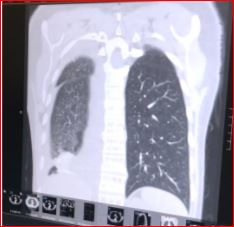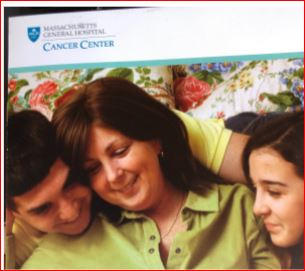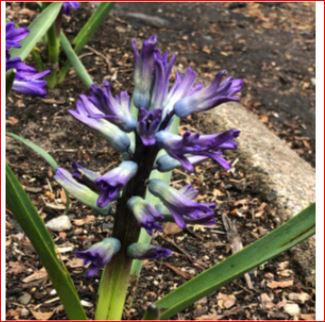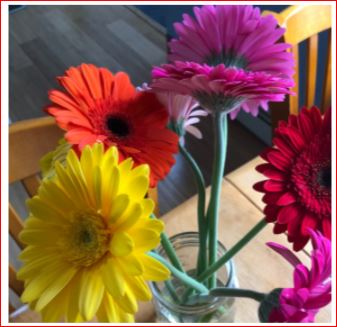When cancer is malignant, fluid can build up around the lung and heart, or inside the abdomen. One to ten liters can accumulate which can make it hard for organs to function. The diaphragm, lungs, heart, pleural spaces get annoyed, irritated, and inflamed. Sometimes they are stretched and expanded to make room while other times the same fluid compresses and causes restriction. The discomfort which might be termed as ascites, pleural effusion, or pericardial effusion can go from quite minor and needing monitoring, to incapacitating (i.e. stabbing pains) and dangerous. Luckily, there are medical procedures that can drain the fluid and alleviate the strain.

But what can one do about the stress, angst, and worry that fills a parent patient’s heart? What do we do when flooded by fear? How do we keep questions about our disease and mortality manageable to appreciate the time we have? How do we navigate a life-threatening diagnosis, disease, and brutal treatments while also remaining a rock for our children? For many of us with advanced cancers, helping our children face a possible future without us is the hardest part of a cancer diagnosis.
“I’m so out of my depth,” I’d said to Paula Rauch, the founder of the Parenting at Challenging Times (PACT) program at Mass General Hospital in Boston where I get cancer care.

I’d shared that both my daughter and I were struggling with my ovarian cancer recurrence because it not only means I must do more chemotherapy but that the treatment is palliative as I can’t be cured. My daughter is a senior in high school. Though she’s not a baby, toddler, or young child – and each age and stage comes with particular challenges, it’s not easy for any child to face adulthood knowing a parent may be gone.
And it’s not easy to be the parent either!
“It’s going to take a mosaic to step in for you,” Paula said. She knows because she has talked with hundreds if not thousands of parents in my situation. She has just the experience and perspective I need and I hope her words help you as much as they are helping me.
Back Story
My daughter was 16 when I was diagnosed with ovarian cancer. Though the odds were slim that I could be cured (about 15%) I was hopeful. I was in my early 50’s and except for cancer was quite healthy. I’d never been admitted for an overnight stay at a hospital and took my good health for granted.
My first focus was on getting cured and putting the business of cancer behind me. I tried to protect my daughter from details about my disease, treatment, or prognosis so she could have a normal-ish high school experience.
Sometimes I was scared and shocked. Sometimes I was also activated, motivated, and determined to fight. Sometimes, I tried to speed up my parenting. I tried to force my daughter up as quickly as possible – just in case I didn’t make it. I rushed her into adult readiness so she would know how to drive, cook, budget, bank, work, and reach out to other adults in her world besides me.
I tried tough love parenting as if I were a gardener trying to weed, compost, till the soil, and make a flower blossom as quickly as possible knowing we might not have all the seasons of life we’d counted on. I couldn’t afford the patient and organic approach. I couldn’t wait for the way seeds take root, explore the soil underground, and find a dark and safe place to gather nutrients before pushing out into the world. I tried to quicken, speed up, and hasten her childhood and turn it into adulthood and fast.

While my intention to push her hard and fast towards independence was understandable, it was abrupt and sudden, and a huge departure from the attachment style parenting I’d always practiced. I regret how little I communicated about why I was pulling away and pushing her so hard to gain mastery with practical adult tasks and skills.
My oncologist noted, denial is a real defense mechanism and remains strong for patients and families. However, he warned, it’s common for recurrence to cause more distress than the original diagnosis because it means that there is no longer any hope of being cured.
For the rest of my days, I will be a metastatic mama and my parenting and priorities have changed. I must actively consider how to parent in a way that prepares my daughter for my possible decline and death.
Who the heck knows how to do this? Not me. I don’t. And while my daughter is a young adult, she is still a teenager, and figuring out if, when, and how much to share and not to share is hard.
I don’t know what I’m doing or how to do this,” I told Paula, confessing that I had already made mistakes.
“Talking is key,” Paula told me and that doesn’t just mean talking with professionals, she said because therapy isn’t “everyone’s cup of tea.” In fact, she said, when parents push kids into therapy the kids sometimes think it means ‘you can’t talk to me’ or ‘I’m not comfortable with that and need you to take it to someone else.’” The goal, Paula said, is to make sure our kids have support, from us, or from other people in her world that she already trusts, or it a new form of support as new situations arise.
She also shared the following gems.
- “Can you support her in gaining a skill set of who to talk to about important things – and it doesn’t have to be with the tagline of – because I’m going to die.”
- “Can you share, as a parenting value, that taking time to pause and get perspective, with other adults, is normal, helpful, etc?”
“When I’m talking with people with a shortened timeline,” Paula said, “it’s helpful to think about a living legacy and people who know you well she can connect to in the future. It’s hard to make a checklist of things to say and do. It’s hard to figure out how to preload, for life. Some parents are like a hallmark special will write a bday card for every future year or future event, and while it’s well-intentioned it can be mis-attuned – because if you’re writing now it is to a future her at another age and maturity.”
- “Can you support her in figuring out who to problem solve?”
- “Can you help her find people in sync with your values?”
- “Can you help her be more confident in her connections and her ability to survive challenging things?”
“Most parenting is on-the-job training,” she reminded me, “and it’s fine to say, as you have, ‘I’ve never done this before.’ Show her how you are reaching out to other people, get support, and do perspective-taking of your own.”

- “Share with her, ‘I may talk to a therapist,” and ask her who are the people she looks for guidance.
- Tell her, “I asked so and so about this. I love this person’s advice.”
- Leave her with the message that it would never be disloyal to you if she attaches to others,” and support and encourage her connections and relationships.
“I literally encourage people to have a list of people your daughter can turn to for a coffee or a meal,” Paula said, if she has questions and to make sure those people do not “turn you into a saint” but to give her a sense of things she can learn about the real you, new things she can continue to learn as relevant to whatever stage she is living.”
She helped me anticipate strategies that can support my daughter throughout her adulthood and understand that bereavement can be a lifelong process. She helped me to normalize grief without minimizing the loss of a parent.
“It can be frightening for children, and really anyone, to bear the existential sense that the person that’s watched me grow up, who has known me my whole life and always been there – might be gone. It’s a gravitational pulling-off axis” She shared what we all know – losing a parent is hard. However, she helped me reframe thoughts of my death.
“Try to think of your life and death – not as an ember going cold,” she said, but as an active and continual process which includes new relationships, learning, and insights, and which can keep the mother-daughter connection alive even if I die.

I’d never considered that before and it comforted me deeply because I know Paula has had far more experience supporting families through grief than I have. Even though I have loved ones I still think of, love, talk to, and feel loved by – who have passed – I forgot that love can be timeless, active, and present beyond life. I had focused on making new memories and preparing my daughter for loss and death, failing to consider the ways I could support and nurture our mother-daughter connection and her relationship with others in the future.
Paula’s words made the bones that had gone cold feel warm again. Her sentences served as blankets removing the chill and ache that nothing else had touched. Her perspective stopped my shallow breaths and made space inside so I could feel expansive again. After our discussion, I felt alive again as a mother. I was reminded of my own instincts and knowing, always available to me like water from a faucet if I just reach out to turn the tap on. Paula helped me to realize I can parent with presence amidst uncertainty and count on my loved ones to step in for me, in the future, if necessary.
“I started this organization more than 25 years ago and many of the kids I worked with are now grown,” Paula told me. “They have told me what is or isn’t helpful. Kids will often take adults up on chances to get new bits of info. and to flesh out a fuller piece of who that parent was through the age they are at. Tell your loved ones not to expect your daughter to be different than she is. She may respond more to an invitation to SO something, rather than talk or talking heavy. Remind adults that for most kids, and some adults, saying, “let me know I can be helpful,” is unlikely to be helpful. Take action instead.”
This advice immediately made sense to me. I realized the ways I had failed to support others in my own life who had grieved by offering platitudes and general statements rather than being more active and supportive. Paula wasn’t trying to shame me; she was just informing me what helps most.

“Make a plan. Issue an invitation – those are more useful,” she told me and encouraged me to share the information with others as well.
“Most people are reticent to follow-up or ask for something in response, to ‘let me know how I can help.’ For many, it is easier to connect while doing something –
- Driving in car
- Doing dishes
- Doing other activities
- Sharing events
“If it’s all about talking, it might not appeal to kids as that is not everyone’s cup of tea,” Paula said.
“You can also let adult loved ones know to let you know, and keep you in the loop if they feel she is struggling,” she told me, and while it’s important not to “intrude on her privacy you can let others know – if it seems she doesn’t want to trouble me – please trouble me,” she suggested by letting them know, “You want to know.”
She was aware of how much has changed as a result of the COVID pandemic. “So much of the other structures (in life) are gone,” Paula said, “but more family time is one benefit for some.”
She suggested I focus on what is coming next for my daughter and that is getting ready for college. “The transition to college is a big deal,” she said, and asked, “Are there ways to still process it together? What does she want for her dorm room? Imagine with her – what would she like/not like and join her in this fun and planning now.”

She reminded me that it’s impossible to plan for every possible life event, and that trying to do so can be misattuned, but that attending to what is near and soon is doable. “In this way, you are PRE-LOADING a shared experience so if your health is not robust enough to walk around the Charles River, for example, in the future she can remember stuff together that you both did and you can, even if not feeling/doing well, share photos and texts of that time,” she explained.
She told me I didn’t have to try to pre-plan everything, make videos, or buy gifts for all future life events, but instead make sure that the connections I have with loved ones continue for my daughter so that even if I die our relationship, though changed, can stay present and continue.
She also shared some of the lessons she learned over the years. “One last warning depending on how things unfold is that many people get into space where they think and say ‘ it’s not fair that my kid has to go through things,” or “This isn’t fair,’ Paula explained. “Try not to do that and instead try to talk about how many things she has thrived through. Not that it wouldn’t be hard – but convey that you have a lot of confidence in her and how she copes,” she told me.
“One of the things is not uncommon with families is a parent dies, the surviving parent gets controlling or tries to protect the adult child from more pain. Instead remind her, “I hope you get x,y, z – but even if you don’t it’s not the hardest thing you have been through and I have confidence in you,” she told me. “Remember to remind her of her amazing strength and that hard things are not just trauma but that, “really hard changes can result in beautiful things.”

Impact of the PACT Interaction
This one conversation helped me shift my focus from trying to plan for every possible thing that could happen and instead to focus on skills, support, and strengths that my daughter already has. It helped me to hold on to and trust that my daughter is a person who is strong, skilled, capable, competent and that I can even imagine her as o.k., well, and getting her needs met in the future and also helping her find ways to stay connected to me – her mother – even after I am gone. It helped me encourage her to find people and love and nurture and care in multiple forms, to hope and expect for that for her, but also to stop pushing her from the nest and instead to connect and parent with all my heart for as long as we have together.
My soul has been deeply soothed. Even if I decline, get sick, and die, it is possible to imagine a future where my daughter not only experiences pain, grief, and loss but one in which she will happy, well, and whole.
I can encourage and convey confidence while staying connected, and I can help others who love me know how best to love my daughter no matter what happens to me. This is advice that is valuable for all parents not only those of us with life-threatening illnesses.
More about the PACT Program
PACT stands for the Parenting at a Challenging Time program founded and directed by Dr. Paula K. Rauch to offer support to cancer patients who are parents of children who are twenty-fours old or younger. It is “build on the belief that parents are experts on the strengths and needs of their children.” The support is free to all parents treated at Mass General Hospital in Boston. PACT is made up of a five-person team providing parent-driven psycho-educational support.
The PACT parent guidance consultation model is to help parents to support children’s adjustment to different stages of a parent’s medical diagnosis, treatment, illness, recurrence, and when necessary, to prepare children for a parent’s anticipated death.
As Paul said to me, “We have the belief that confusion is the enemy of coping and that having someone quickly accessible at the time you need it is better than every Tuesday. at 2 p.m.” is what parents need. In addition, all of the support is free. Parents need not be diagnosed, labeled, or billed. Paula shared that when She said that when a parent makes contact, a PACT program clinician remains available and responsive if and when things come up.
To contact the Mass General Hospital Cancer Center’s Marjorie E. Korff PACT Program in Boston, MA, and directed by Dr. Paula Rauch:
- Phone: (617)724-7272
- www.mghpact.org
To contact the Pappas PACT program, available for parents who are being treated at the Mass General Cancer Center at Newton-Wellesley, in Newton, MA and directed by Dr. Jennifer Koch, M.D.:
- Phone: (617)831-7430
- www.nwh.org
Note: While the PACT program is only available at these two Mass General Hospitals hospitals, the PACT website is available for parents treated anywhere, and has some helpful resources. In addition, the PACT program founder, Dr. Paula Kasch, has a book entitled, Raising an Emotionally Healthy Child When a Parent is Sick.
You Matter Mantras
- Trauma sucks. You don't.
- Write to express not to impress.
- It's not trauma informed if it's not informed by trauma survivors.
- Breathing isn't optional.
You Are Invited Too & To:
- Heal Write Now on Facebook
- Parenting with ACEs at the ACEsConectionNetwork
- The #FacesOfPTSD campaign.
- When I'm not post-traumatically pissed or stressed I try to Twitter, Instagram & Pinterest.
Speak Your Mind